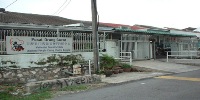
WHEEL POWER
By ANTHONY THANASAYAN
Disabled and elderly dog owners are upset by MBPJ’s decision not to waive the dog licence fee.
APRIL 1 turned out to be a disappointing day for pet lovers. It was reported in the newspapers that the Petaling Jaya City Council (MBPJ), in a majority decision, had chosen not to grant free dog licences to handicapped and elderly residents.
A proposal was put forward to the council to offer a full fee waiver for disabled pet lovers, and a 50% discount for all elderly persons in PJ.
(Currently dog owners in PJ pay RM10 annually for their pets. Only the Shah Alam City Council offers such relief to the disabled and elderly.)
The proposal was meant to offer some relief and support for persons whose pets play an integral role in their lives. The proposal came from handicapped and elderly members of Petpositive, an animal-assisted therapy society where I serve as president.
It has the backing of several disability and animal NGOs, namely, the Independent Living and Training Centre in Rawang, Selangor, the Malaysian Parkinson’s Disease Association in Kuala Lumpur, and the Society for the Prevention of Cruelty to Animals in Selangor.
The move raises an important question about how local councils operate. When decisions that affect the lives of disabled persons are made, do our local governments ensure that they consult the disabled before they give the go-ahead?
And in this particular situation, not just any disabled person but the handicapped and the elderly who are receiving animal-assisted therapy.
Dogs possess an uncanny ability to help the disabled to lead positive lives. In so doing, the handicapped are able to achieve a better quality of life. This has been proven by medical experts and researchers.
Do those who make such decisions take the trouble to visit the homes of individuals with disabilities to see these wonderful canines in action?
Do decision-makers know what it’s like to be in a wheelchair? Or what it’s like to soil their pants because they have a weak bladder or poor bowel control (or both) as a result of an accident or illness?
As for the able-bodied who have dogs, are they dependent on their pets for therapy the way people in wheelchairs, the blind and the deaf are?
Take, for example, wheelchair users Sue Chen and her husband who own two dogs which they regard as their children. They don’t make much money so they have to share what’s on their table when they dine, with their pets.
“Every sen counts,” said the couple. “Besides, it would save us the hassle of travelling to the local authorities’ office and joining the long queues just to get our licences renewed.
“The taxi fare to the local council and back is almost three times the cost of the licence. Having our dogs greet us in the morning and follow us everywhere gives us a sense of acceptance, belonging and security,” they explained.
JK is another example of how animal-assisted therapy can make a difference. He was bedridden recently following an accident and now spends his time looking at the four walls of his room. His only pal is a puppy that was introduced to him recently.
The puppy is doing wonders for JK; he is starting to focus on his new friend instead of dwelling on his misery.
Wouldn’t it be wonderful if our respective councils could show some care and compassion by appreciating the special role of canines, and be mindful of the hardships the disabled face?
Sources: The Star






No comments:
Post a Comment